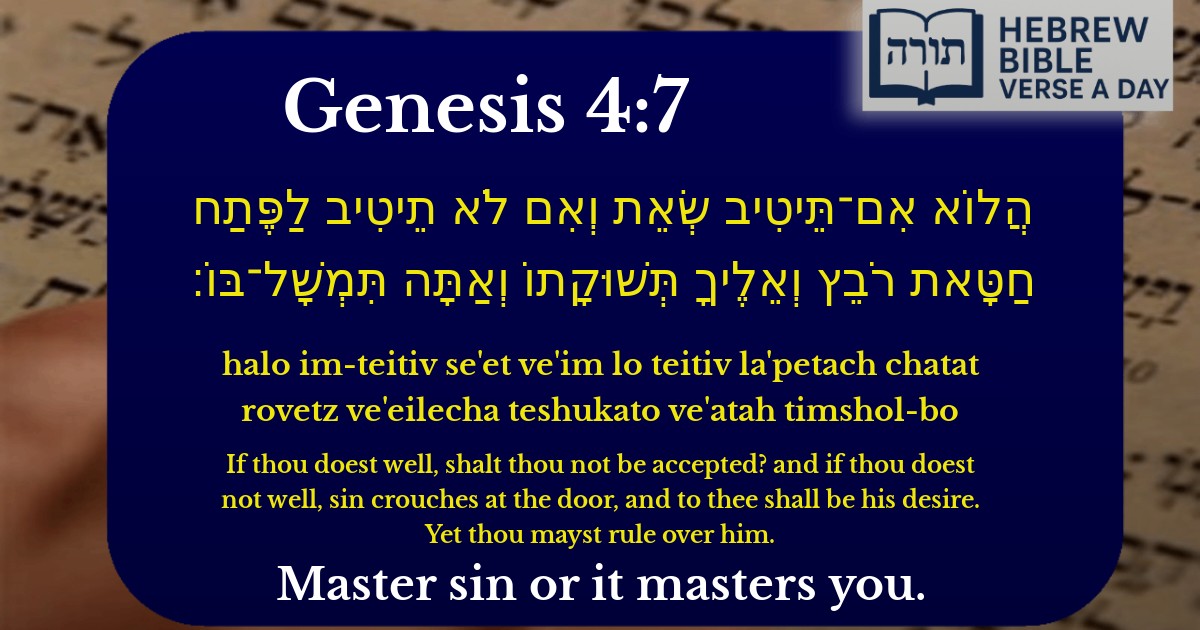Join Our Newsletter To Be Informed When New Videos Are Posted
Join the thousands of fellow Studends who rely on our videos to learn how to read the bible in Hebrew for free!
Hebrew Text
הֲלוֹא אִם־תֵּיטִיב שְׂאֵת וְאִם לֹא תֵיטִיב לַפֶּתַח חַטָּאת רֹבֵץ וְאֵלֶיךָ תְּשׁוּקָתוֹ וְאַתָּה תִּמְשָׁל־בּוֹ׃
English Translation
If thou doest well, shalt thou not be accepted? and if thou doest not well, sin crouches at the door, and to thee shall be his desire. Yet thou mayst rule over him.
Transliteration
Halo im-teitiv se'et ve'im lo teitiv la'petach chatat rovetz ve'eilecha teshukato ve'atah timshol-bo
Hebrew Leining Text
הֲל֤וֹא אִם־תֵּיטִיב֙ שְׂאֵ֔ת וְאִם֙ לֹ֣א תֵיטִ֔יב לַפֶּ֖תַח חַטָּ֣את רֹבֵ֑ץ וְאֵלֶ֙יךָ֙ תְּשׁ֣וּקָת֔וֹ וְאַתָּ֖ה תִּמְשׇׁל־בּֽוֹ׃
הֲל֤וֹא אִם־תֵּיטִיב֙ שְׂאֵ֔ת וְאִם֙ לֹ֣א תֵיטִ֔יב לַפֶּ֖תַח חַטָּ֣את רֹבֵ֑ץ וְאֵלֶ֙יךָ֙ תְּשׁ֣וּקָת֔וֹ וְאַתָּ֖ה תִּמְשׇׁל־בּֽוֹ׃
🎵 Listen to leining
Parasha Commentary
📚 Talmud Citations
This verse is quoted in the Talmud.
📖 Sanhedrin 91b
The verse is referenced in a discussion about the nature of sin and its consequences, illustrating how sin is always at the door, waiting to ensnare a person if they do not do well.
📖 Avodah Zarah 5b
The verse is cited in a broader discussion about human inclination towards sin and the possibility of overcoming it, emphasizing the idea that one can rule over sin if they choose to do well.


Context and Overview
This verse (Bereshit 4:7) is part of Hashem's dialogue with Kayin (Cain) before he murders his brother Hevel (Abel). It serves as both a warning and an opportunity for repentance, emphasizing free will and moral responsibility.
Key Interpretations from Classical Commentators
Midrashic Insights
The Midrash (Bereshit Rabbah 22:6) compares sin to a lurking predator, emphasizing its persistent nature. Yet, the verse reassures that one can "rule over it," teaching that teshuvah (repentance) is always possible before sin fully takes hold.
Halachic and Ethical Implications
The Rambam (Hilchot Teshuvah 5:1) derives from this verse that repentance is always accessible, even after severe transgressions. The yetzer hara may be powerful, but Torah study and mitzvot provide the tools to overcome it (Kiddushin 30b).
Linguistic Analysis